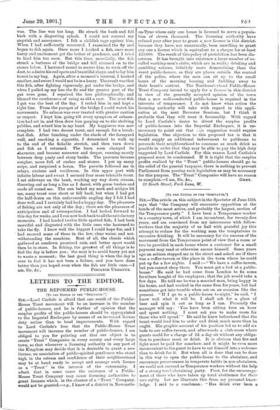LETTERS TO THE EDITOR.
THE REFORMED PUBLIC-HOUSE.
Fro VIE EDITOR OF THE "SPECTATOR."]
Snr,—Lord Carlisle is afraid that one result of the Public- House Trust movement will be an increase in the number of public-houses, and he is further of opinion that the surplus profits of the public-houses should be appropriated to the Imperial Exchequer by means of an increased license duty rather than to local improvements. With regard to Lord Carlisle's fear that the Public-House Trust movement will increase the number of public-houses, I am obliged to you for pointing out that our object is to create " Trust" Companies in every county and every large town, so that whenever a licensing authority in any part of the Kingdom may decide that it is desirable to grant a new license, an association of public-spirited gentlemen who stand high in the esteem and confidence of their neighbourhood may be at hand ready to accept and manage such license as a "Trust" in the interest of the community. I admit that in some cases the existence of a Public. House Trust Company may cause licensing authorities to grant licenses which, in the absence of a " Trust " Company, would not be granted,—e.g., I know of a district in Newcastle- on-Tyne where only one house is licensed to serve a popula- tion of eleven thousand. The licensing authority have refused year after year to grant a new license in this district, because they have, not unnaturally, been unwilling to grant any one a license which is equivalent to a cheque for at least £20,000. The result of this policy of prohibition has been dis- astrous. It has brought into existence a large number of so- called working-men's clubs, which are in reality drinking and gambling saloons, infinitely more demoralising than the worst public-houses, as they are places outside the control of the police, where the men can sit up to the small hours of the morning boozing and fuddling away to their heart's content. The Northumberland Public-House Trust Company intend to apply for a license in this district in view of the generally accepted opinion of the town that a new well-conducted public-house is required in the interests of temperance. I do not know what action the licensing authority will take with regard to this appli- cation at ths next Brewster Sessions, but I think it probable that they will treat it favourably. With regard to Lord Carlisle's desire to divert the surplus profits of public-houses into the Imperial Exchequer, it is un- necessary to point out that :Ails suggestion would require legislation. One objection to this proposed tax is that it would supply an additional inducement to publicans to persuade their neighbourhood to consume as much drink as possible in order that they may be able to pay the high duty suggested by Lord Carlisle. For this reason Lord Carlisle's proposal must be condemned. If it is right that the surplus profits realised by the " Trust " public-houses should go. to the relief of the general taxpayer, there is nothing to prevent Parliament from passing such legislation as may be necessary for this purpose. The "Trust" Companies will have no reason
to complain.—I am, Sir, &c., GREY. 22 South Street, Park Lane, W.




















































 Previous page
Previous page